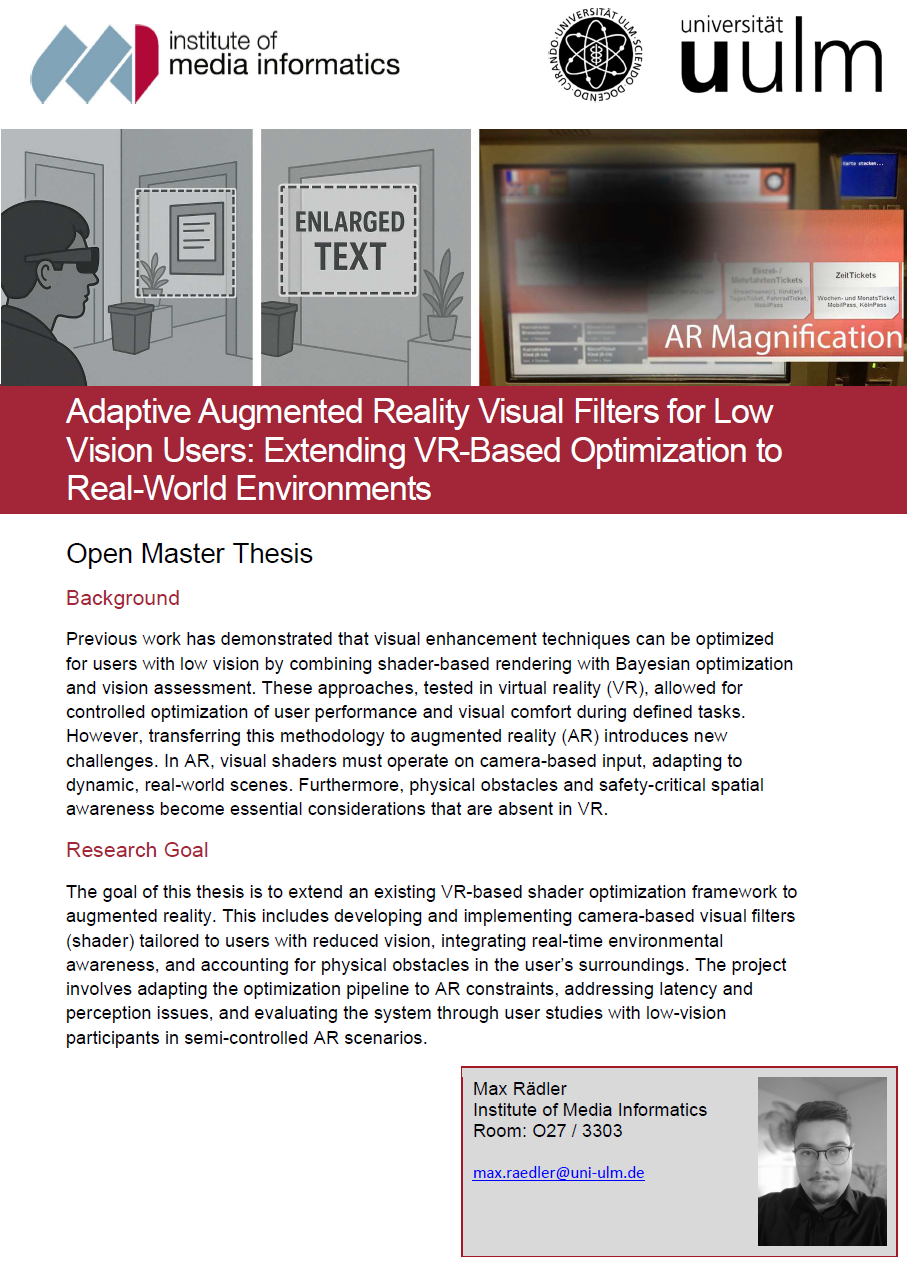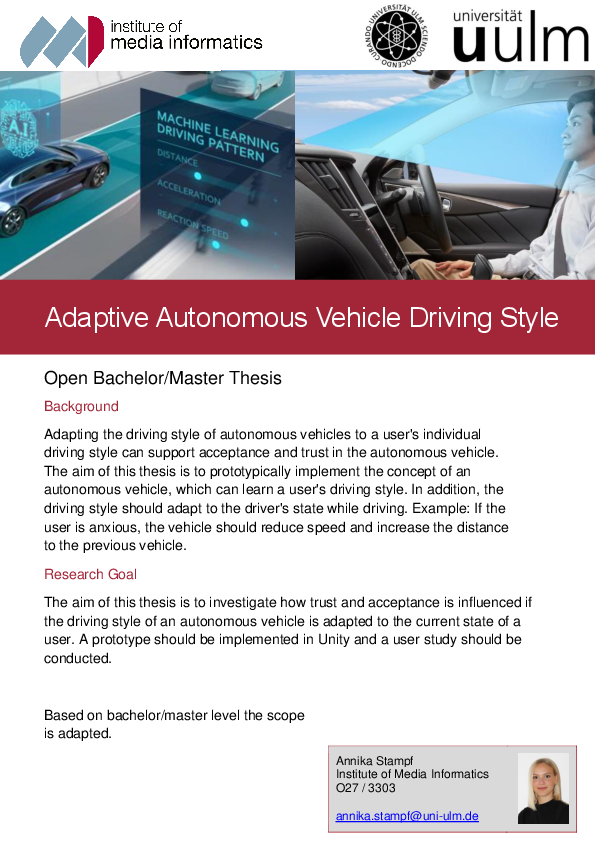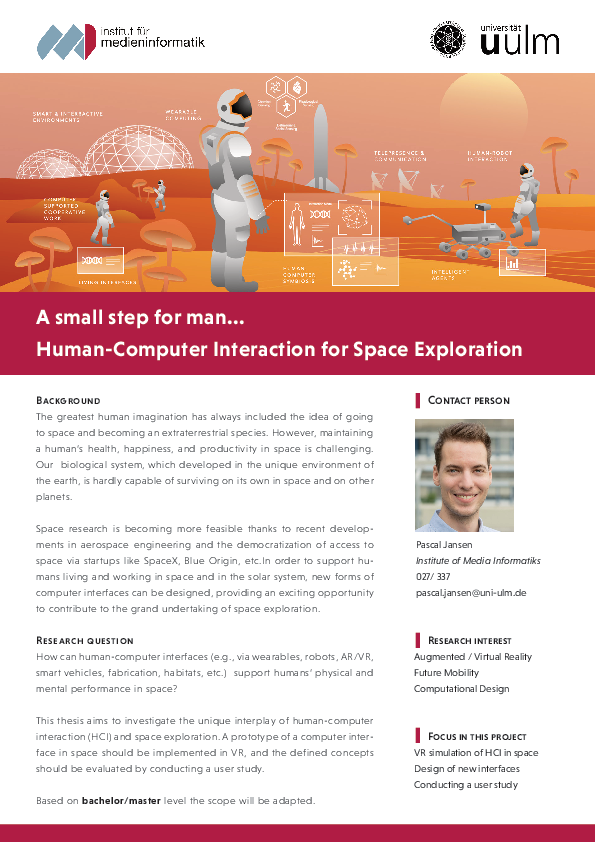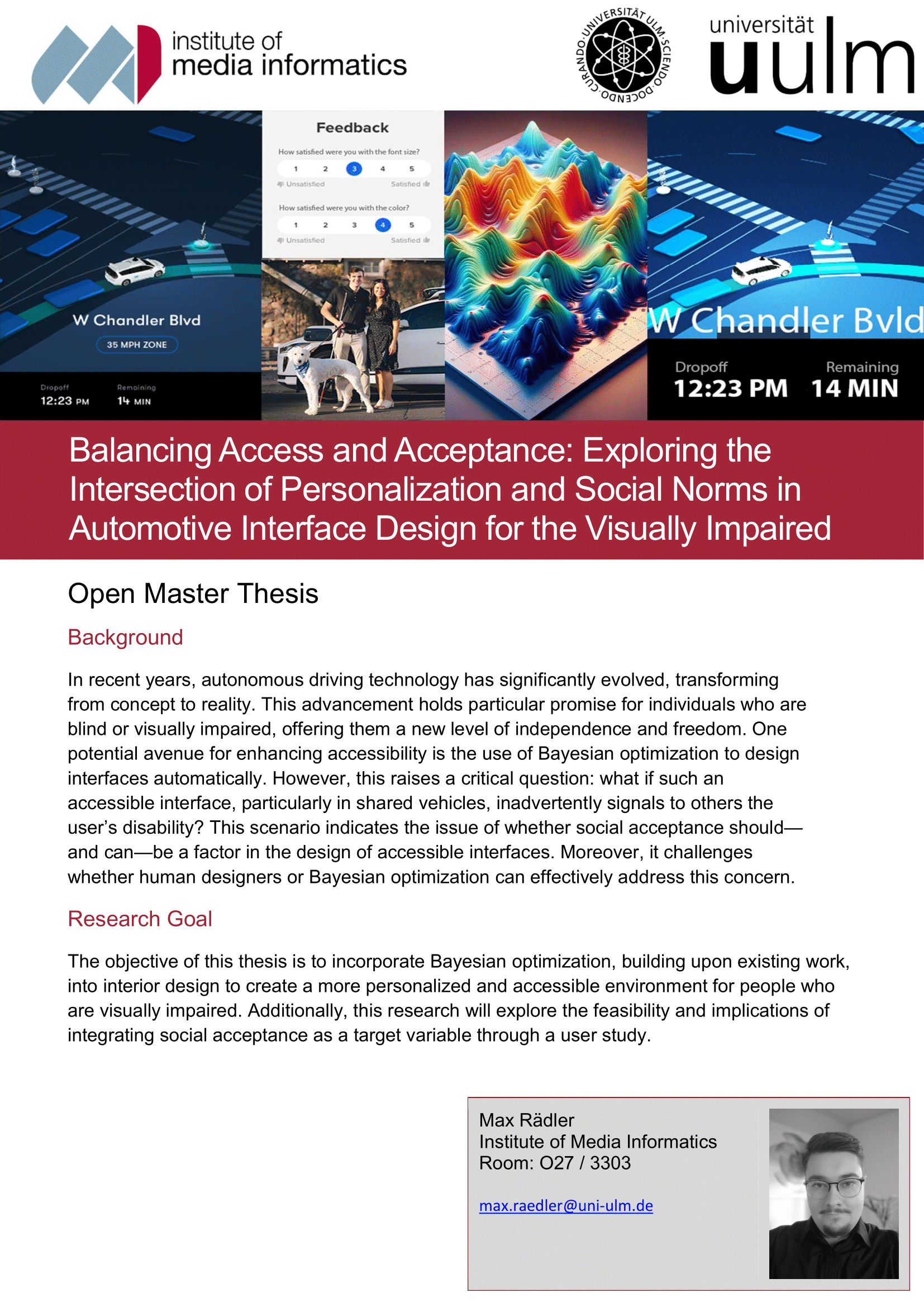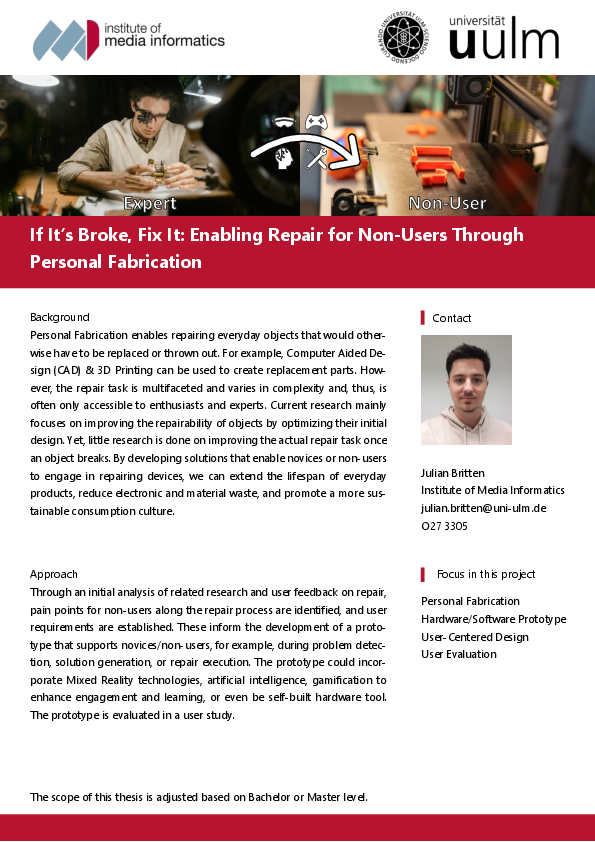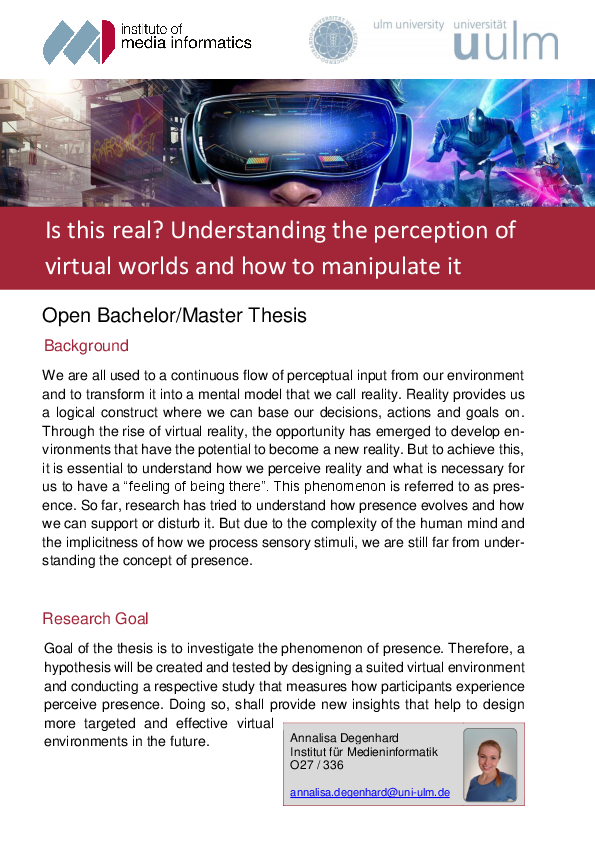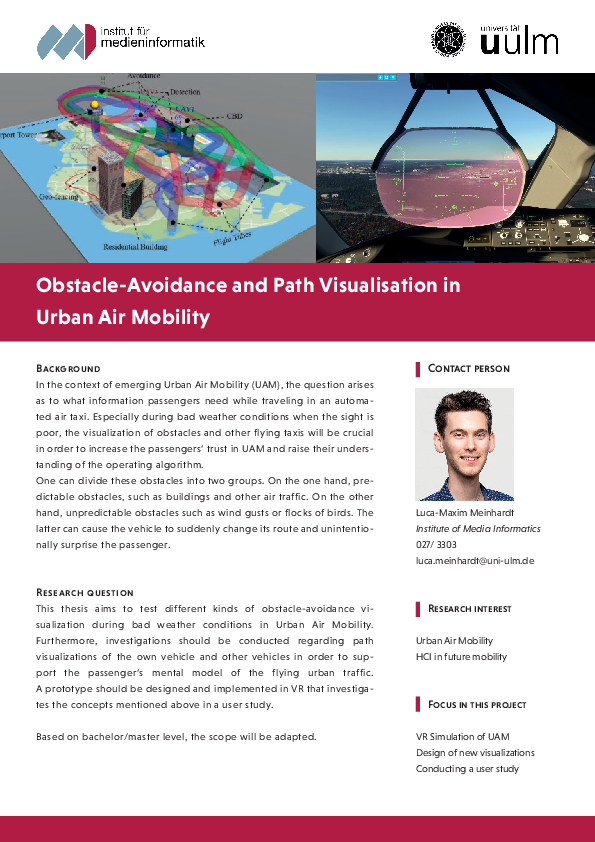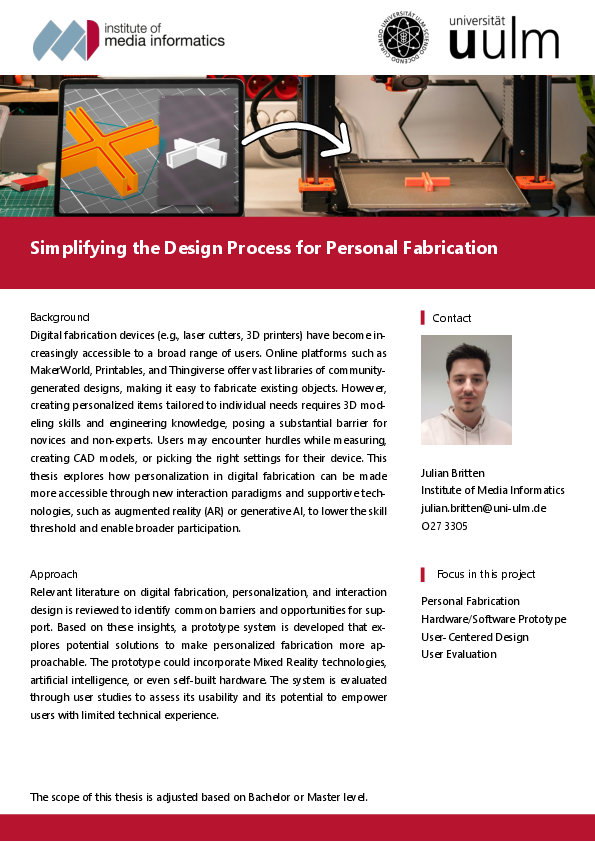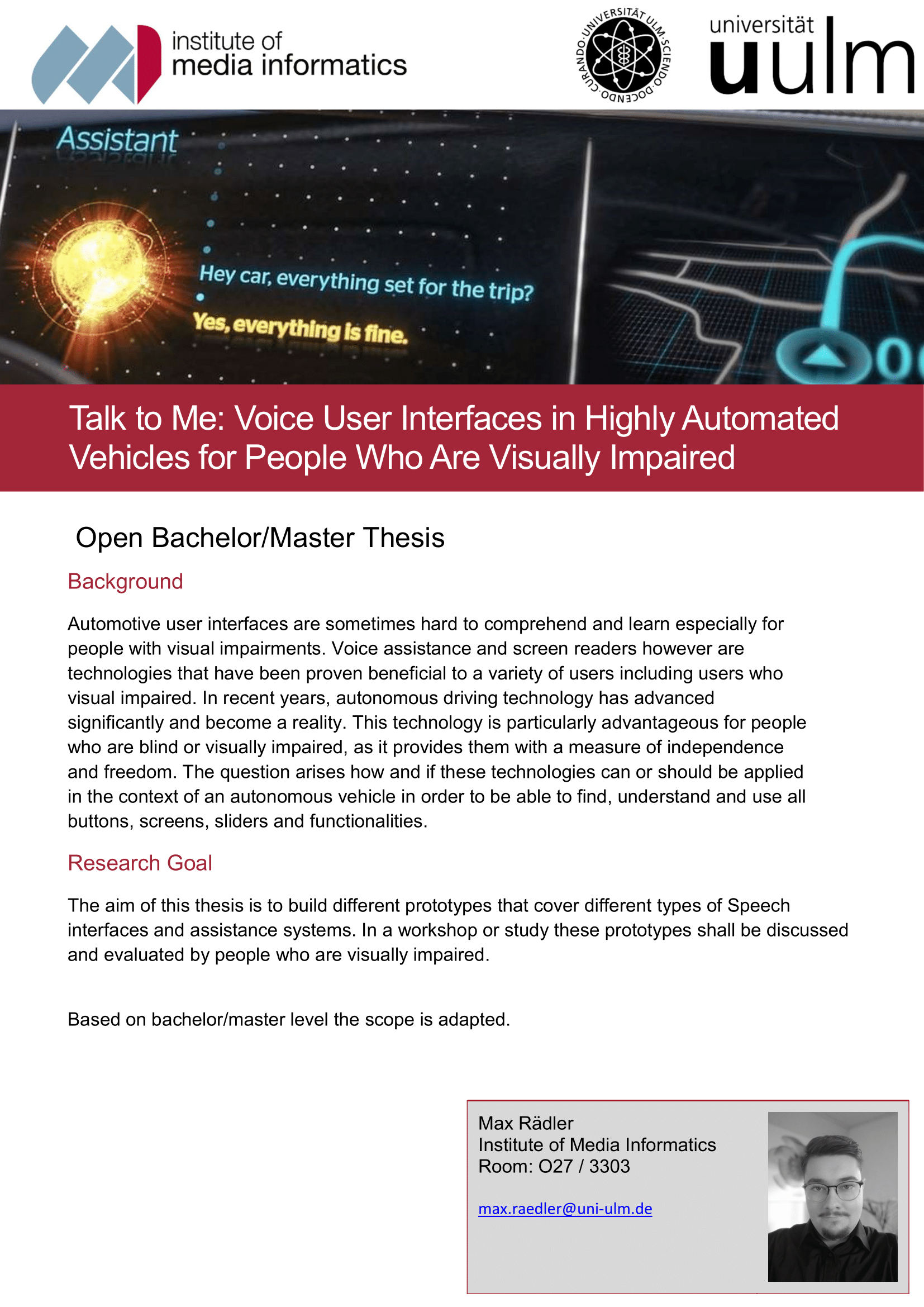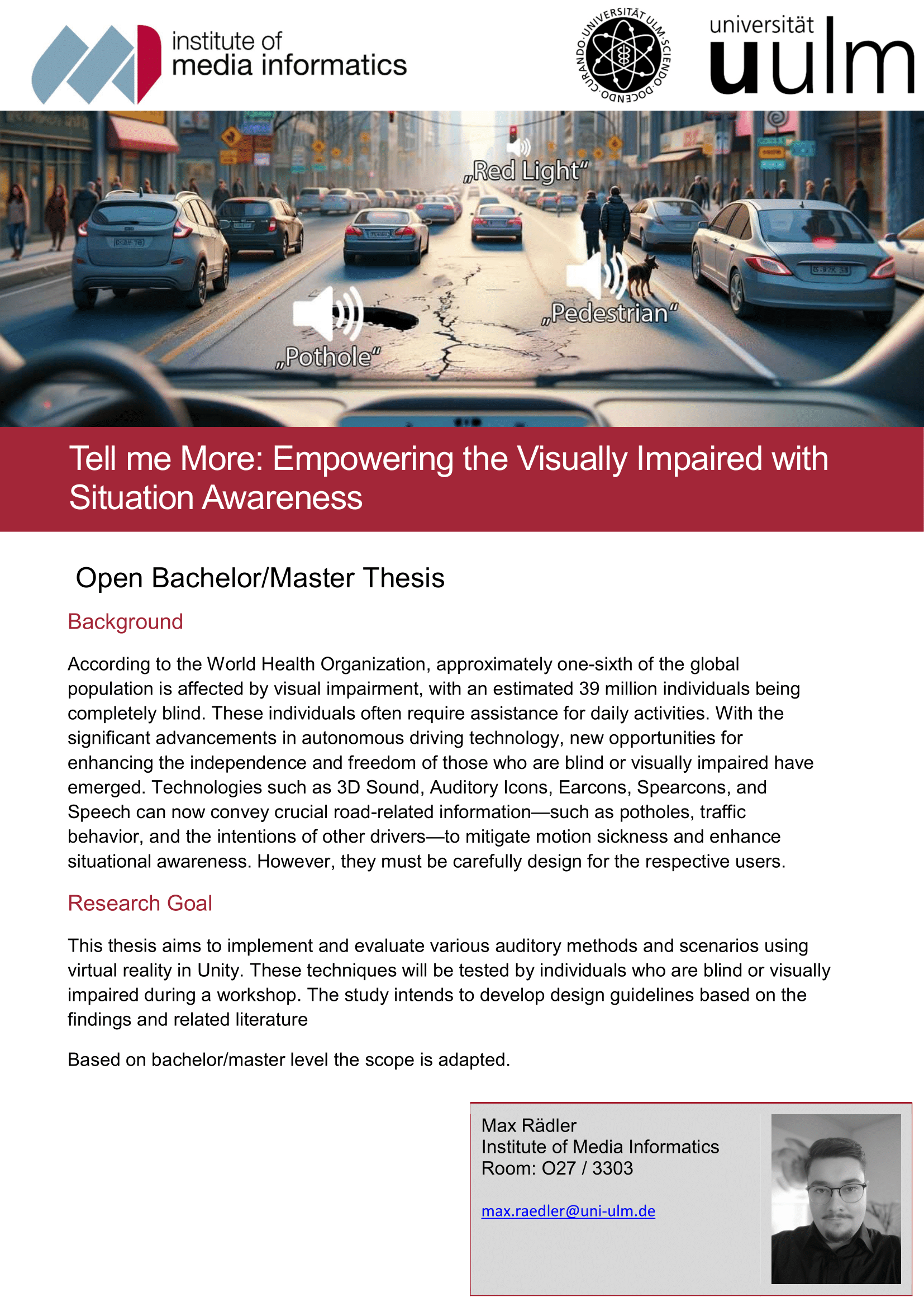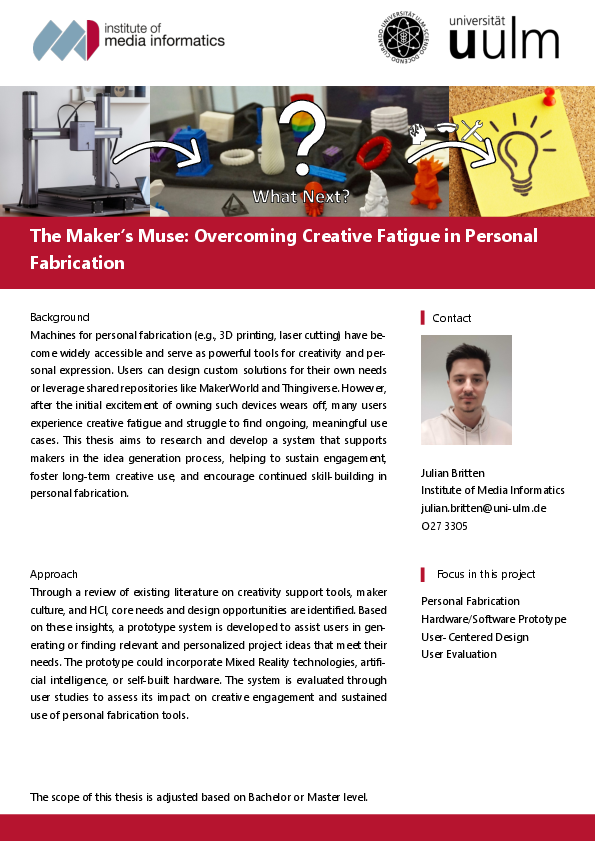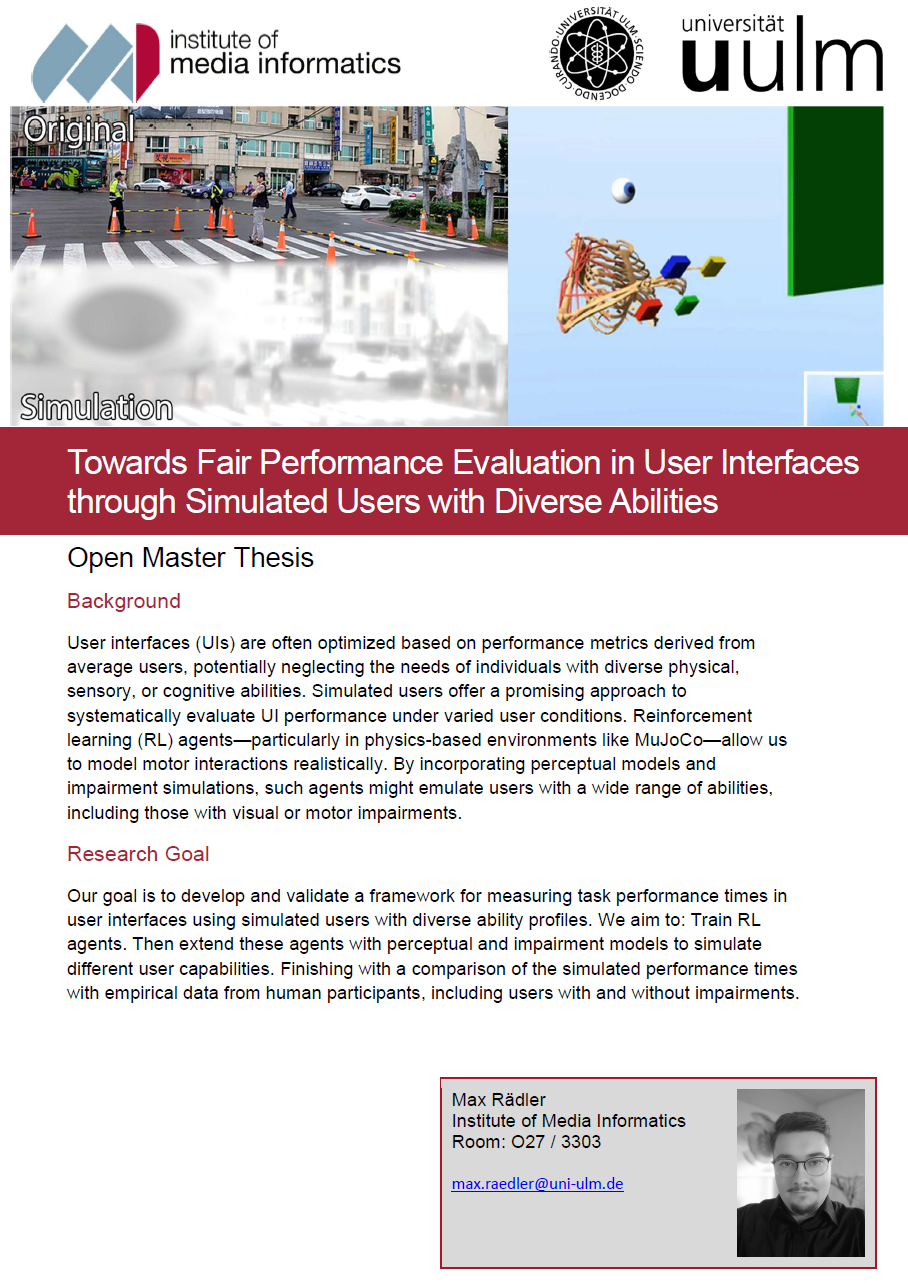Thesis Topics - Human-Computer Interaction, Prof. Dr Rukzio
Bachelor- & Masterarbeiten im Bereich Mensch-Computer-Interaktion
Wir bieten die Betreuung von Abschlussarbeiten für Bachelor- und Masterstudierende hauptsächlich in den Studiengängen Medieninformatik, Informatik, Software Engineering und Cognitive Systems an.
Auf dieser Seite befindet sich eine Auswahl aktueller Themenvorschläge für solche Arbeiten; Studierende dürfen aber auch ihre eigenen Themenvorschläge vorbringen und mit einer geeigneten Betreuerin oder einem geeigneten Betreuer diskutieren. Die gelisteten Beschreibungen sind zum Teil nur aus dem Uni-Netz einsehbar.
Bei Interesse empfehlen wir daher, direkt eine Mitarbeiterin oder einen Mitarbeiter der Forschungsgruppe anzusprechen.
Überblick über aktuell angebotene Themen für Bachelorniveau
Überblick über aktuell angebotene Themen für Masterniveau
Supervisor: Max Rädler
Level: Master
Description:
This thesis extends a VR-based visual aid system for low vision users into augmented reality. The goal is to develop camera-based AR filters that enhance real-world readability while addressing new challenges like physical obstacles and environmental dynamics.
Details zu offenen Abschlussarbeiten
Supervisor: Annika Stampf
Level: Bachelor / Master
Description:
The aim of this thesis is to investigate how trust and acceptance is influenced if the driving style of an autonomous vehicle is adapted to the current state of a user. A prototype should be implemented in Unity and a user study should be conducted.
Supervisor: Annika Stampf
Level: Bachelor / Master
Description:
The aim of this work is to investigate what anthropomorphic features can be used in in-vehicle interfaces (such as physiological signals, e.g. heart beat or a nudge to the driver from the vehicle). These identified features should be implemented prototypically in a VR environment with Unity. Subsequently, a user study should be conducted to evaluate whether those identified features have a positive impact on passengers' trust in HAVs.
Supervisor: Pascal Jansen
Level: Bachelor / Master
Description: How can human-computer interfaces (e.g., via wearables, robots, AR/VR, smart vehicles, fabrication, habitats, etc.) support humans‘ physical and mental performance in space? This thesis aims to investigate the unique interplay of human-computer interaction (HCI) and space exploration. A prototype of a computer interface in space should be implemented in VR, and the defined concepts should be evaluated by conducting a user study.
Supervisor: Max Rädler
Level: Master
Description:
This thesis explores the use of Bayesian optimization to design accessible interfaces for autonomous vehicles, focusing on the visually impaired. As autonomous driving evolves, offering new levels of independence, the challenge arises in designing interfaces that do not inadvertently disclose the user's disability in shared settings. This research aims to incorporate Bayesian optimization into vehicle interior design, creating personalized environments while considering social acceptance as a crucial factor. The feasibility of these designs will be assessed through a user study, exploring the balance between accessibility and social discretion.
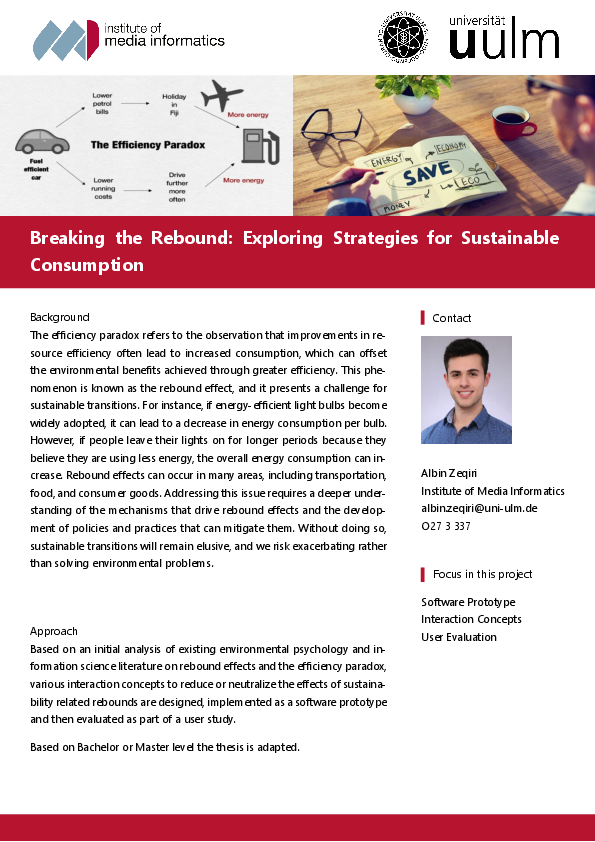
Supervisor: Albin Zeqiri
Level: Bachelor & Master
The efficiency paradox (also known as "rebound effect") is the concept that increases in resource efficiency can lead to higher consumption, which offsets the environmental benefits. For example, energy-efficient light bulbs may lead to decreased energy consumption per bulb, but leaving them on for longer periods could increase overall energy consumption. Without addressing the issue, sustainable transitions will remain challenging, and environmental issues will persist or even worsen. The goal of theses on this topic is to design and evaluate countermeasures to mitigate these effects. Based on Bachelor or Master level the thesis is adapted.
Supervisor: Luca-Maxim Meinhardt
Level: Bachelor & Master
Description
The first thing we do when we get up and the last thing we do before we go to sleep is to look at our phone to check for new notifications and search for new content on social media. Unfortunately, our dependence on technology is already so deeply integrated into our habits that we do not even realize how often we use our phones. On the one hand, this addiction harms us by being less focused due to distraction via notifications. Additionally, it is said that social media contributes to our attention span getting smaller. On the other hand, technology usage is also harming our social interactions during face-to-face interactions. For example, some people focus on their phones instead of engaging in a conversation, decreasing its quality. Recent trends in wearable technology, such as smartwatches and AR glasses, might even deteriorate this behavior. Therefore, new methods and interactions must be found to nudge people towards healthier technology usage and change their habits unconsciously.
Supervisor: Luca-Maxim Meinhardt
Level: Bachelor & Master
Description
The human peripherical vision provides us with information without shifting our focus from the primary task. This is particularly interesting since peripheral vision demands less cognitive load. So information that is positioned at the edge of the field of view can be received unconsciously without drawing attention. A prominent example is car driving since only a short moment of inattention might end in serious accidents. However, even daily struggles with loud and attention-drawing smartphone notifications that distract from working might be solved calmly with peripherical displays. In order to enable this concept, Augmented Reality glasses are the key since they provide us with wearable displays attached to our view.
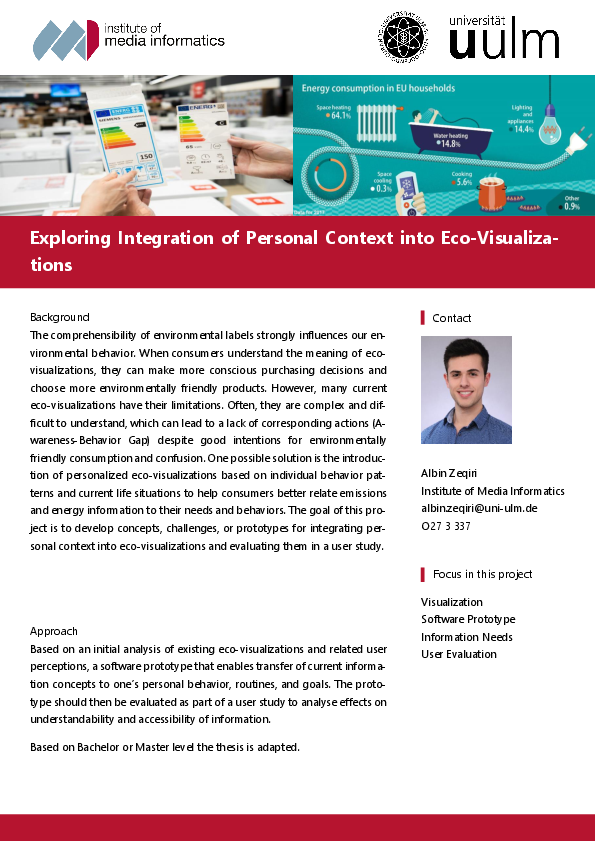
Supervisor: Albin Zeqiri
Level: Bachelor & Master
Environmental labels play a significant role in shaping our behavior towards the environment. Understanding the meaning of eco-visualizations can help consumers make informed and sustainable purchase decisions. However, current eco-visualizations are often complex and difficult to comprehend, leading to a lack of action and confusion among consumers. The Awareness-Behavior Gap describes this issue. Personalized eco-visualizations tailored to individual behavior patterns and lifestyles could be a solution to this problem. This project aims to develop concepts, prototypes, and solutions to integrate personalized context into eco-visualizations and evaluate their effectiveness in user studies.
Supervisor: Luca Meinhardt and Jana Funke
Level: Bachelor & Master
Description: Based on literature research and related work, this thesis will aim for a solution to boost our self-control in phone usage. Our goal is to help people establish healthier smartphone usage by nudging them to do sports instead of browsing the phone.
Supervisor: Annika Stampf
Level: Bachelor / Master
Description:
The aim of this work is to design and prototypically implement an in-vehicle avatar, which is able to adapt to the appearance of a passenger, for example by using DeepFake. The avatar should be further able to mimic the passenger. Subsequently, a user study should be conducted to evaluate whether similarity and mimicry have positive impacts on passengers trust in highly automated vehicles.
Supervisor: Julian Britten
Level: Bachelor / Master
Description:
Personal Fabrication enables repairing everyday objects that would otherwise have to be replaced or thrown out. For example, Computer Aided Design (CAD) & 3D Printing can be used to create replacement parts. However, the repair task is multifaceted and varies in complexity and, thus, is often only accessible to enthusiasts and experts. Current research mainly focuses on improving the repairability of objects by optimizing their initial design. Yet, little research is done on improving the actual repair task once an object breaks. By developing solutions that enable novices or non-users to engage in repairing devices, we can extend the lifespan of everyday products, reduce electronic and material waste, and promote a more sustainable consumption culture.
Supervisor: Annika Stampf
Level: Bachelor / Master
Description:
The aim of this work is to design new implicit in-vehicle interaction concepts for highly automated vehicles (HAVs). These concepts should be implemented with Unity (in a driving simulator or VR environment). Subsequently, a user study should be conducted to evaluate whether those concepts have a positive influence on passengers’ trust, acceptance, and user experience in HAVs.
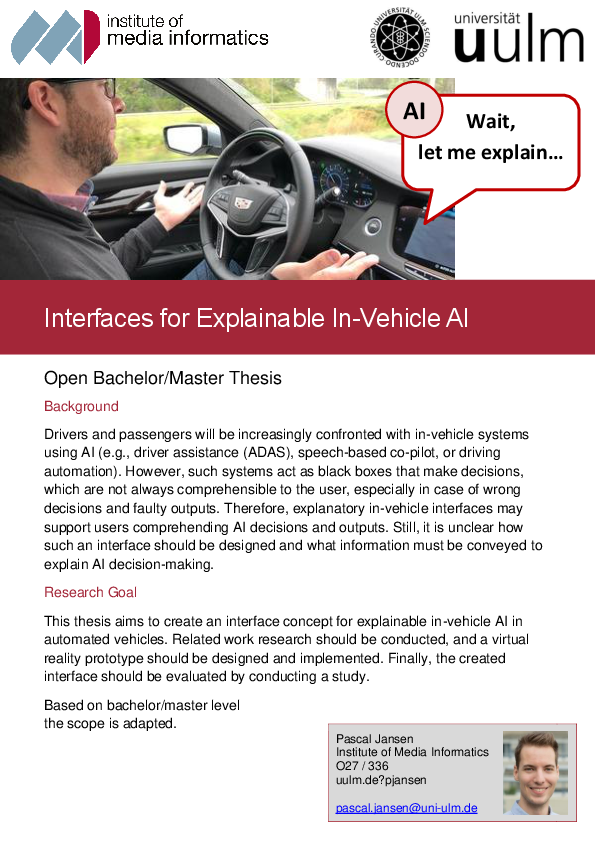
Supervisor: Pascal Jansen
Level: Bachelor / Master
Description: This thesis aims to create an interface concept for explainable in-vehicle AI in automated vehicles. Related work research should be conducted, and a virtual reality prototype should be designed and implemented. Finally, the created interface should be evaluated by conducting a study.
Supervisor: Annalisa Degenhard
Level: Master
The aim of this thesis is to explore the phenomenon of presence in virtual reality. A literature analysis should be conducted. By designing a suitable virtual environment a hypothesis on the behavior of presence will be tested in a user study. The goal is to get insights into how users perceive virtual environments and to draw conclusions on how they should be designed to improve the experience of virtual reality.
Supervisor: Luca-Maxim Meinhardt
Level: Bachelor & Master
Description
Imagine the scenario that you need to translate a document in a foreign language that you are not familiar with. You will probably look for an online translator such as Google Translator or DeepL and just copy the translator’s output. But how can you trust this translation? How can you be sure that the translation is precisely what you are trying to say? Prominent examples are sayings that might have no meaning if translated word by word. But since you are not familiar with the language, you cannot verify if the online translator grasped the hidden meaning behind the saying. Current online translators lack this explainability. They provide multiple alternatives for the translated phrase, but there is no explanation about why these alternatives were shown and how well they suit the inputted text.
Obstacle-Avoidance and Path Visualisation in Urban Air Mobility
Supervisor: Luca-Maxim Meinhardt
Level: Bachelor & Master
Description
This thesis aims to test different kinds of obstacle-avoidance visualization during bad weather conditions in Urban Air Mobility. Furthermore, investigations should be conducted regarding path visualizations of the own vehicle and other vehicles in order to support the passenger‘s mental model of the flying urban traffic. A prototype should be designed and implemented in VR that investigates the concepts mentioned above in a user study.
Supervisor: Luca-Maxim Meinhardt
Level: Bachelor & Master
Description: Urban Air Mobility (UAM) has started to gain increasing interest in future mobility. Unlike conventional transportation such as buses and trains, flying taxis will not be limited to predefined routes, thus avoiding transportation delays. Hence, the vision is to create a network of flying vehicles operating in metropolitan areas to connect short and medium distances.
Experts predict that the first UAM vehicles will lift passengers in the mid 2020th. In fact, the first crewed flight of the German start-up Volocopter successfully ran 2019 in Singapour.
UAM will shift air mobility from the current mass transportation to a relatively private ride with 2-4 passengers, which creates new interesting aspects for HCI research since the passengers are focused.
Supervisor: Julian Britten
Level: Bachelor / Master
Description:
Digital fabrication devices (e.g., laser cutters, 3D printers) have become increasingly accessible to a broad range of users. Online platforms such as MakerWorld, Printables, and Thingiverse offer vast libraries of community-generated designs, making it easy to fabricate existing objects. However, creating personalized items tailored to individual needs still requires 3D modeling skills and basic engineering knowledge - posing a substantial barrier for novices and non-experts. This thesis explores how personalization in digital fabrication can be made more accessible through new interaction paradigms and supportive technologies, such as augmented reality (AR) or generative AI, to lower the skill threshold and enable broader participation.
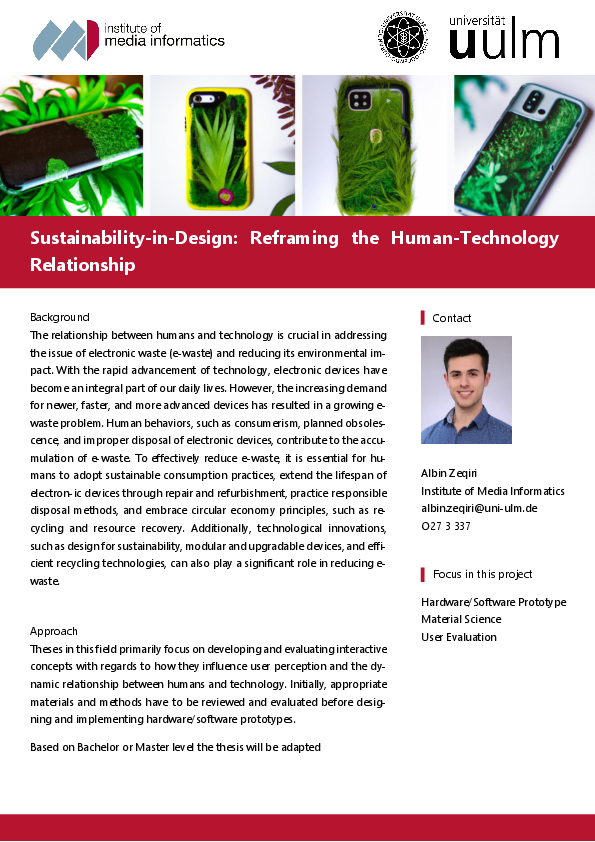
Supervisor: Albin Zeqiri
Level: Bachelor & Master
Goals of theses in this area cover the development of new, interactive concepts that introduce living materials or even microorganisms into hardware and map its respective needs to various device functionalities. Based on bachelor or master level, the scope is adapted.
Supervisor: Max Rädler
Level: Bachelor / Master
Description:
This thesis explores the integration of voice assistance and screen reader technologies in autonomous vehicle interfaces to enhance usability for visually impaired users. With advancements in autonomous driving providing increased independence for the blind and visually impaired, the focus here is on determining how these assistive technologies can be adapted for automotive use. This involves developing various prototypes of speech interfaces and assistance systems. The effectiveness and user-friendliness of these prototypes will be assessed through workshops or studies involving visually impaired participants, aiming to ensure that all vehicle controls are accessible and comprehensible.
Supervisor: Max Rädler
Level: Bachelor / Master
Description:
This thesis focuses on utilizing auditory technologies such as 3D Sound and Earcons in autonomous vehicles to aid visually impaired individuals. With significant advancements in autonomous driving, these technologies can enhance situational awareness by conveying essential road information. This project will implement these auditory methods in Unity's virtual reality environment and evaluate their effectiveness through a workshop with visually impaired participants. The study aims to develop practical design guidelines based on the findings and existing literature.
Supervisor: Julian Britten
Level: Bachelor / Master
Description:
Machines for personal fabrication (e.g., 3D printing, laser cutting) have become widely accessible and serve as powerful tools for creativity and personal expression. Users can design custom solutions for their own needs or leverage shared repositories like MakerWorld and Thingiverse. However, after the initial excitement of owning such devic-es wears off, many users experience creative fatigue and struggle to find ongoing, meaningful use cases. This thesis aims to research and develop a system that supports makers in the idea generation process, helping to sustain engagement, foster long-term creative use, and en-courage continued skill-building in personal fabrication.
Supervisor: Max Rädler
Level: Master
Description:
User interfaces are often designed with the average user in mind, which can leave out those with different physical, sensory, or cognitive abilities. Simulated users—especially reinforcement learning agents in environments like MuJoCo—offer a way to realistically model diverse interactions by incorporating motor and perceptual differences. Our goal is to develop a framework that uses these agents, enhanced with models of impairment, to simulate users with varying abilities. We'll then compare their task performance times to real data from both impaired and non-impaired users.
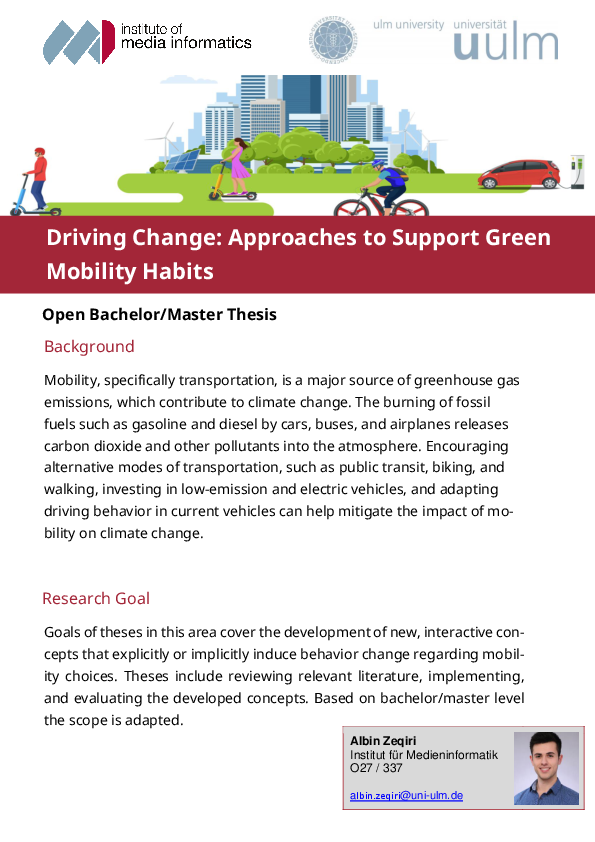
Supervisor: Albin Zeqiri
Level: Bachelor
Goals of theses in this area cover the development of new, interactive concepts that explicitly or implicitly induce behavior change regarding mobility choices. Theses include reviewing relevant literature, implementing, and evaluating the developed concepts. Based on bachelor/master level the scope is adapted.
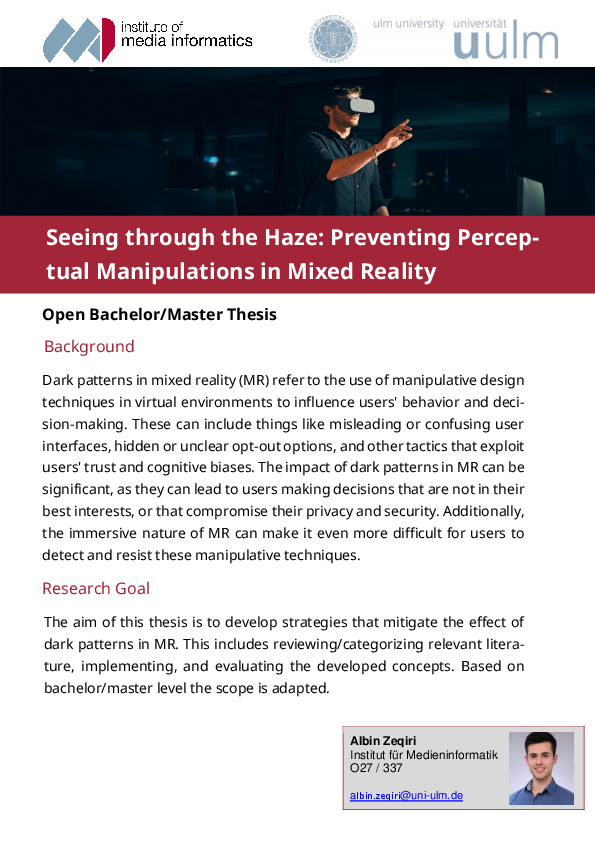
Supervisor: Albin Zeqiri
Level: Bachelor
The aim of this thesis is to develop strategies that mitigate the effect of dark patterns in MR. This includes reviewing/categorizing relevant literature, implementing, and evaluating the developed concepts. Based on bachelor/master level the scope is adapted

